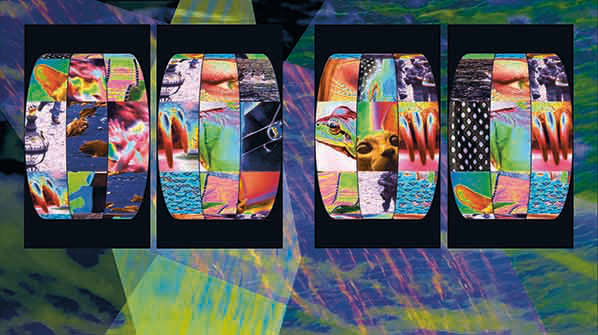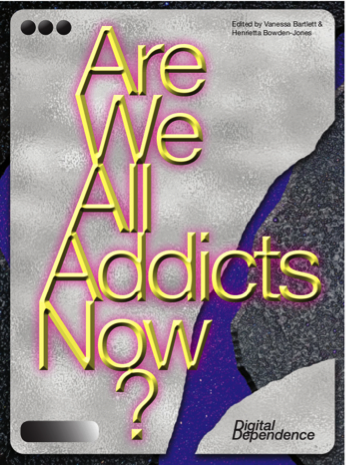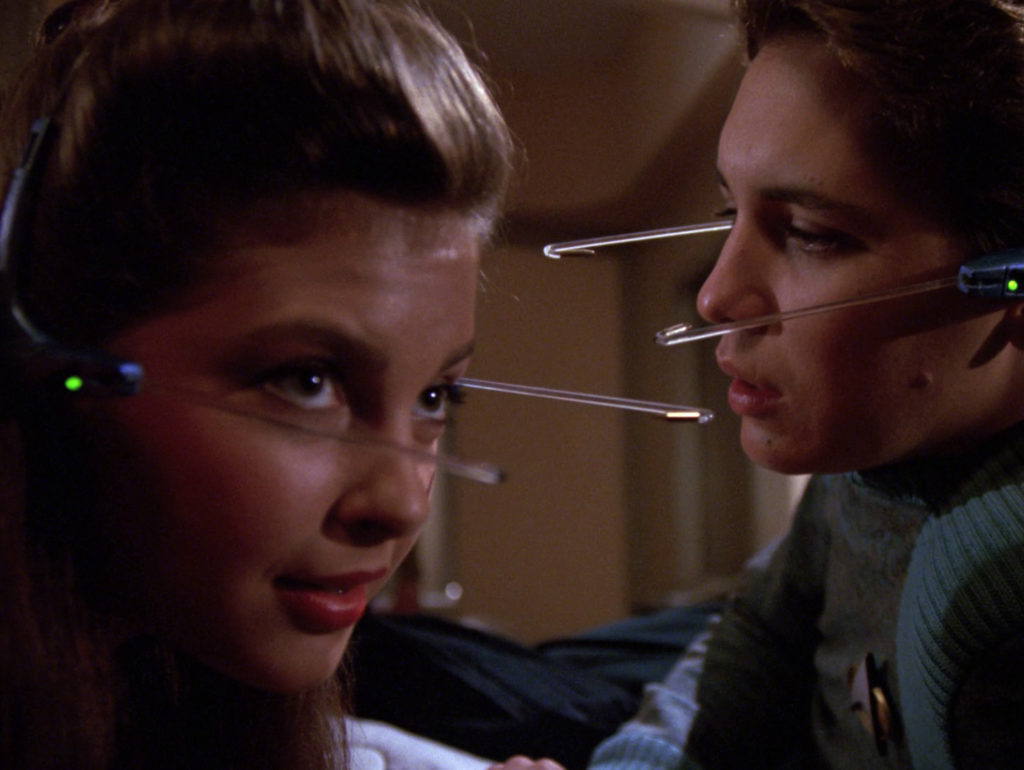



DOWNLOAD PRESS RELEASE
FREE DOWNLOAD OF EXHIBITION DOCUMENTATION
SEE IMAGES FROM THE PRIVATE VIEW
Featuring Katriona Beales and Fiona MacDonald.
The exhibition and research project Are We All Addicts Now? explores the seductive and addictive qualities of the digital.
Artist Katriona Beales’ work addresses the sensual and tactile conditions of her life lived online: the saturated colour and meditative allure of glowing screens, the addictive potential of infinite scroll and notification streams. Her new body of work for AWAAN re-imagines the private spaces in which we play out our digital existence. The exhibition includes glass sculptures containing embedded screens, moving image works and digitally printed textiles. Beales’ work is complemented by a new sound-art work by artist and curator Fiona MacDonald : Feral Practice.
Beales celebrates the sensuality and appeal of online spaces, but criticises how our interactions get channeled through platforms designed to be addictive – how corporations use various ‘gamification’ and ‘neuro-marketing’ techniques to keep the ‘user’ on-device, to drive endless circulation, and monetise our every click. She suggests that in succumbing to online behavioural norms we emerge as ‘perfect capitalist subjects’.
For Furtherfield, Beales has constructed a sunken ‘bed’ into which visitors are invited to climb, where a glowing glass orb flutters with virtual moths repeatedly bashing the edges of an embedded screen. A video installation, reminiscent of a fruit machine, displays a drum of hypnotically spinning images whose rotation is triggered by the movement of gallery visitors. Beales recreates the peculiar, sometimes disquieting, image clashes experienced during her insomniac journeys through endless online picture streams – beauty products lining up with death; naked cats with armed police.

Glass-topped tables support the amorphous curves of heavy glass sculptures, which refract the multi-coloured light of tiny screens hidden inside. Visualisations of eye-tracking data (harvested live from gallery visitors) scatter across the ceiling. On the exterior wall of the gallery, an LED scrolling sign displays text Beales’ has compiled, based on comments from online forums about internet addiction.
Where Beales addresses the near-inescapability of machine-driven connection, Feral Practice draws us into the networks in nature. Mycorrhizal Meditation is a sound-art work for free download, accessed via posters in Furtherfield Gallery and across Finsbury Park. MM takes the form of a guided meditation, journeying through the human body and down into the ‘underworld’ of living soil, with its mycorrhizal network formed of plant roots and fungal threads. It combines spoken word and sound recordings of movement and rhythm made in wooded places. Feral Practice complicates the idea of nature as ‘ultimate digital detox’, and alerts us to the startling interconnectivity of beyond-human nature, the ‘wood-wide-web’ that pre-dates our digital connectivity by millennia. (Download Mycorrhizal Mediation here)
Are We All Addicts Now? has been developed in collaboration with artist-curator Fiona MacDonald : Feral Practice, clinical psychiatrist Dr Henrietta Bowden-Jones, and curator Vanessa Bartlett.
Glowing light of screens makes us #addictsnow – they are the mini-suns we bask in to keep away the dark https://t.co/jedrDUE2ZWpic.twitter.com/BmTTbFckFp
— furtherfield (@furtherfield) July 27, 2017
View more of the comissioned gifs and tweets here
In the run up to the exhibition, artists Charlotte Webb and Connor Rigby have been commissioned to produce a series of gifs and tweets to stimulate debate around the designed-for-addiction nature of digital devices, and the ethics and politics that surround this. Join the conversation @furtherfield on Twitter and Instagram using the hashtag #addictsnow
Accompanying the exhibition, a book designed by Stefan Schafer and edited by Vanessa Bartlett and Henrietta Bowden-Jones, brings together Beales’ and MacDonald’s artwork and writing with essays from contributors in the fields of anthropology, digital culture, psychology and philosophy. This book is the first interdisciplinary study of the emerging field of internet addiction. Contributors will discuss their essays at a symposium convened by Vanessa Bartlett at Central Saint Martins in November 2017. Advanced copies of the book are on sale at the Liverpool University Press website https://liverpooluniversitypress.co.uk/products/100809

Beales’ work ‘Entering the Machine Zone’ has been co-commissioned with Science Gallery London. An iteration of the work will be presented as part of HOOKED, the opening season of the new Science Gallery London, curated by Hannah Redler.
Exhibition Tour of Are We All Addicts Now? with Ruth Catlow and Katriona Beales
Saturday 16th September 2017, 2-4 pm
Furtherfield Gallery
Join Furtherfield co-director Ruth Catlow and artist Katriona Beales to find out more about the works featured in the exhibition Are We All Addicts Now? and to discuss the issues that it raises around digital addiction and online behaviour.FREE | booking essential
Late Night Opening & Film Screening
Friday 29th September 2017, 5 – 8.30pm
Furtherfield Gallery & Commons
A late night opening of the Are We All Addicts Now? exhibition, followed by a screening of artists’ moving image work that has informed the development of the exhibition.
Gallery Open: 5 – 7pm
Screening: 7 – 8.30pm
FREE | booking essential
Mycorrhizal Event with Fiona MacDonald : Feral Practice
Saturday 21st October 2017, 2 – 4pm
Furtherfield Commons
Fiona MacDonald: Feral Practice presents a lecture, a performance, and a fungi walk. Informed by the history, art and science of human-fungal relations, these experiences explore themes of reciprocity, intuitive and nonverbal interconnection between people, psychedelic consciousness, fungal songs, shamanic journeying, and plant communication.
FREE | booking essential
Visual Matrix Workshop with Vanessa Bartlett
Thursday 2nd November, 4 – 6.30pm
Furtherfield Commons
Join curator Vanessa Bartlett for a research workshop responding to works in the Are We All Addicts Now? exhibition. The visual matrix is a new psychosocial research technique that we are using to generate audience response to this project. Content generated during this session will inform our evaluation of the exhibition.
For more information and to book your place contact info [at] vanessabartlett.com
FREE | email v.bartlett [at] unsw.edu.au to book your place.
Are We All Addicts Now? Symposium and Book Launch at CSM
Tuesday 7th November, 6.30-9pm
Central Saint Martins, University of the Arts London, 1 Granary Square, London, N1C 4AA
This event celebrates the publication of Are We All Addicts Now? Digital Dependence edited by Vanessa Bartlett and Henrietta Bowden-Jones and will feature presentations from many of the book’s key contributors who include:
During the symposium, psychologists, philosophers and artists come together to discuss the emerging diagnosis of internet addiction. Taking into account our precarious economic and political climate, they will ask whether internet addiction should be understood as a form of illness, or simply a sensible adaptation to our current environment? As increasing numbers of people struggle to moderate their online behaviours, this event will also explore artists’ strategies for counteracting the seductive, addiction-making qualities of digital space.
Convened by curator Vanessa Bartlett
Presented in partnership with Central Saint Martins Art/Design and Science Research Group
The book, ‘Are We All Addicts Now?’ is available from Liverpool University Press: liverpooluniversitypress.co.uk/products/100809
See photos from the Symposium and Book Launch
See a recording of the Symposium and Book Launch – Part 1 | Part 2
£4 – £7 | booking essential
Katriona Beales is an artist who makes digital artefacts, moving image and installation, stressing the physicality of digital life. Are We All Addicts Now? develops Beales’ 2015 work ‘White Matter’ (a FACT commission for ‘Group Therapy: Mental Distress in a Digital Age’) which is showing at the University of New South Wales, Sydney as part of Anxiety Festival (Sept 2017). Beales’ received an MA from Chelsea College of Arts and has an artist profile on Rhizome.org
www.katrionabeales.com
Fiona MacDonald is an artist, curator and writer specializing in human-nonhuman relationship. As Feral Practice, she works in co-production with a collective of human and nonhuman persons. Current projects include Foxing, (see PEER London, 2017) Ant-ic Actions (see Ethical Entanglements, Bloomsbury Press, forthcoming) Homo Mycelium, and Wood to World (London, Kent, Aberdeen 2015-17).
www.feralpractice.com
Vanessa Bartlett is a researcher and curator based between Australia and the UK. She studies and teaches at UNSW Art & Design, Sydney where her research investigates connections between digital technologies and mental health through reflective curatorial practice. Her recent exhibition Group Therapy: Mental Distress in a Digital Age showed at FACT (Foundation for Art and Creative Technology), UK in 2015 and opens at UNSW Galleries Sydney in September 2017.
www.vanessabartlett.com
Dr. Charlotte Webb is an artist and deviant academic. She speaks and exhibits internationally, focusing on the web as a medium for creative practice, critical thinking and collective action.
Furtherfield is an internationally renowned arts organisation specialising in labs, exhibitions and debate for increased, diverse participation with emerging technologies. At Furtherfield Gallery and Furtherfield Lab in London’s Finsbury Park, we engage more people with digital creativity, reaching across barriers through unique collaborations with international networks of artists, researchers and partners. Through art Furtherfield seeks new imaginative responses as digital culture changes the world and the way we live.
“There is no other gallery like Furtherfield. Situated in the middle of Finsbury Park they attract people from all walks of life and focus on contemporary technology and how it affects the lives of people and the world we live in.” (Liliane Lijn, artist)
Furtherfield Gallery
McKenzie Pavilion
Finsbury Park, London, N4 2NQ
Visiting Information
Thanks to:
The Wellcome Trust
Arts Council England
Science Gallery London
Central Saint Martins
BF Skinner Foundation
Haringey Council
Bruce Marks (glass artist)
Rob Prouse (raspberry Pi and AV technician)
Through our interactions with digital devices and systems us humans are now a diverse resource to other humans and machines. And we are changing in accordance with the processes and demands of contemporary, technological market systems, designed to extract as much data from us as possible. In his recent article Our minds can be hijacked, Paul Lewis of the Guardian revealed that those in the know, those who helped to create Google, Twitter and Facebook, are now disconnecting themselves from the Internet as, like millions of people in the world, they are feeling the effects of addiction to social networking platforms, and fear its wider consequences to society.
The hazards of this kind of tech-contagion have been the staple food of sci-fi for decades – a mysterious woman shares a strange but simple VR game in the 1991 episode of Next Generation Star Trek, The Game. It spreads like wildfire, taken up with enthusiasm by the crew, only later revealed to be a brainwashing tool invented by an alien captain to seize control of first the ship, and then all of Starfleet. Let’s look at ourselves for a moment – if we can tear our gaze away from our screens. How has our public behaviour changed – on the streets, on public transport, in buildings and parks? Our attention transfixed by our devices, online via our phones and tablets – bumping into each other, and even walking into the road endangering their own and others’ lives.

Professor of psychology Jean M. Twenge studies post-millennials and argues that a whole younger generation in the US, would rather stay in doors than going out and partying. Even though they are generally safer from material harm they are on the brink of a mass mental-health crisis. She says this dramatic shift in social behavior emerged at exactly the moment when the proportion of Americans who owned a smartphone surpassed 50 percent. Twenge has termed those born between 1995 and 2012, as generation iGen. With no memory of a time before the Internet, they grew up constantly using smartphones and having Instagram accounts. In her article Have Smartphones Destroyed a Generation? Twenge writes “Rates of teen depression and suicide have skyrocketed since 2011. It’s not an exaggeration to describe iGen as being on the brink of the worst mental-health crisis in decades. Much of this deterioration can be traced to their phones.”
Internet addiction is like having your head perpetually inside a magical mirror of hypnotically disembodying power #addictsnow pic.twitter.com/DFkl1jaKER
— furtherfield (@furtherfield) August 31, 2017
From the #addictsnow Twitter commission by Charlotte Webb and Conor Rigby, 2017
We offer three features as part of Furtherfield’s 2017 Autumn editorial theme of digital addiction, in parallel with the exhibition Are We All Addicts Now? at the Furtherfield Gallery, until 12th November 2017. Artist Katriona Beales has developed the exhibition and events programme in collaboration with artist-curator Fiona MacDonald: Feral Practice, clinical psychiatrist Dr Henrietta Bowden-Jones, and curator Vanessa Bartlett. She explores the seductive qualities, and the effects of our everyday digital experiences. Beales suggests that in succumbing to on-line behavioural norms we emerge as ‘perfect capitalist subjects’ informing new designs, driving endless circulation, and the monetisation of our every swipe, click and tap.
Firstly we present this interview with Katriona Beales* from the new book Digital Dependence (eds Vanessa Bartlett and Henrietta Bowden-Jones, 2017) in which she discusses her work and her research into the psychology of variable reward, “one of the most powerful tools that companies use to hook users… levels of dopamine surge when the brain is expecting a reward. Introducing variability multiplies the effect” and creates a frenzied hunting state of being.
Pioneer of networked performance art, Annie Abrahams, creates ‘situations’ on the Internet that “reveal messy and sloppy sides of human behaviour” in order to awaken us to the reality of our networked condition. In this interview, Abrahams reflects on the limits and potentials of art and human agency in the context of increased global automation.
Finally a delicious prose-poem-hex from artist and poet Francesca da Rimini (aka doll yoko, GashGirl, liquid_nation, Fury) who traces a timeline of network seduction, imaginative production and addictive spaces from early Muds and Moos.
“once upon a time . . .
or . . .
in the beginning . . .
the islands in the net were fewer, but people and platforms enough
for telepathy far-sight spooky entanglement
seduction of, and over, command line interfaces
it felt lawless
and moreish
“
And a final recommendation – The Glass Room, curated by Tactical Tech
Tactical Tech are in London until November 12 with The Glass Room, exhibition and events programme. A fake Apple Store at 69-71 Charing Cross Road, operates as a Trojan horse for radical art about the politics of data and offers an insight into the many ways in which we are seduced into surrendering our data. “At the Data Detox Bar, our trained Ingeniuses are on hand to reveal the intimate details of your current ‘data bloat’; who capitalises on it; and the simple steps to a lighter data count.”
*This interview is published with permission from the publishers of the book Digital Dependence edited by Vanessa Bartlett and Henrietta Bowden-Jones, available to purchase from the LUP website here.